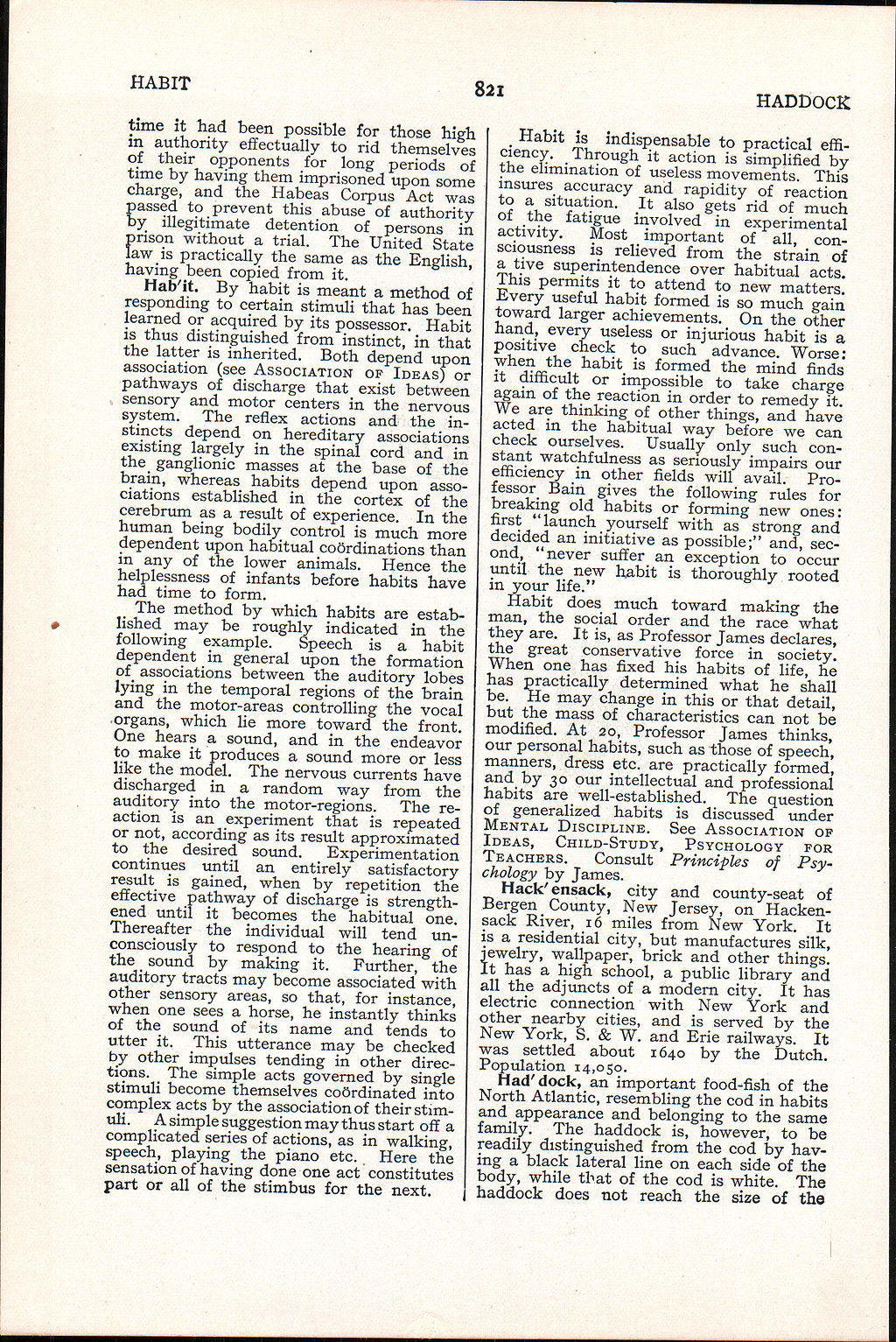time it had been possible for those high in authority effectually to rid themselves of their opponents for long periods of time by having them imprisoned upon some charge, and the Habeas Corpus Act was passed to prevent this abuse of authority by illegitimate detention of persons in prison without a trial. The United States law is practically the same as the English, having been copied from it.
Hab′it. By habit is meant a method of responding to certain stimuli that has been learned or acquired by its possessor. Habit is thus distinguished from instinct, in that the latter is inherited. Both depend upon association (see Association of Ideas) or pathways of discharge that exist between sensory and motor centers in the nervous system. The reflex actions and the instincts depend on hereditary associations existing largely in the spinal cord and in the ganglionic masses at the base of the brain, whereas habits depend upon associations established in the cortex of the cerebrum as a result of experience. In the human being bodily control is much more dependent upon habitual coördinations than in any of the lower animals. Hence the helplessness of infants before habits have had time to form.
The method by which habits are
established may be roughly indicated in the
following example. Speech is a habit
dependent in general upon the formation
of associations between the auditory lobes
lying in the temporal regions of the brain
and the motor-areas controlling the vocal
organs, which lie more toward the front.
One hears a sound, and in the endeavor
to make it produces a sound more or less
like the model. The nervous currents have
discharged in a random way from the
auditory into the motor-regions. The
reaction is an experiment that is repeated
or not, according as its result approximated
to the desired sound. Experimentation
continues until an entirely satisfactory
result is gained, when by repetition the
effective pathway of discharge is strengthened
until it becomes the habitual one.
Thereafter the individual will tend
unconsciously to respond to the hearing of
the sound by making it. Further, the
auditory tracts may become associated with
other sensory areas, so that, for instance,
when one sees a horse, he instantly thinks
of the sound of its name and tends to
utter it. This utterance may be checked
by other impulses tending in other
directions. The simple acts governed by single
stimuli become themselves coördinated into
complex acts by the association of their stimuli.
A simple suggestion may thus start off a
complicated series of actions, as in walking,
speech, playing the piano etc. Here the
sensation of having done one act constitutes
part or all of the stimbulus for the next.
Habit is indispensable to practical efficiency. Through it action is simplified by the elimination of useless movements. This insures accuracy and rapidity of reaction to a situation. It also gets rid of much of the fatigue involved in experimental activity. Most important of all, consciousness is relieved from the strain of active superintendence over habitual acts. This permits it to attend to new matters. Every useful habit formed is so much gain toward larger achievements. On the other hand, every useless or injurious habit is a positive check to such advance. Worse: when the habit is formed the mind finds it difficult or impossible to take charge again of the reaction in order to remedy it. We are thinking of other things, and have acted in the habitual way before we can check ourselves. Usually only such constant watchfulness as seriously impairs our efficiency in other fields will avail. Professor Bain gives the following rules for breaking old habits or forming new ones: first “launch yourself with as strong and decided an initiative as possible;” and, second, “never suffer an exception to occur until the new habit is thoroughly rooted in your life.”
Habit does much toward making the man, the social order and the race what they are. It is, as Professor James declares, the great conservative force in society. When one has fixed his habits of life, he has practically determined what he shall be. He may change in this or that detail, but the mass of characteristics can not be modified. At 20, Professor James thinks, our personal habits, such as those of speech, manners, dress etc. are practically formed, and by 30 our intellectual and professional habits are well-established. The question of generalized habits is discussed under Mental Discipline. See Association of Ideas, Child-Study, Psychology for Teachers. Consult Principles of Psychology by James.
Hack′ensack, city and county-seat of Bergen County, New Jersey, on Hackensack River, 16 miles from New York. It is a residential city, but manufactures silk, jewelry, wallpaper, brick and other things. It has a high school, a public library and all the adjuncts of a modern city. It has electric connection with New York and other nearby cities, and is served by the New York, S. & W. and Erie railways. It was settled about 1640 by the Dutch. Population 14,050.
Had′dock, an important food-fish of the North Atlantic, resembling the cod in habits and appearance and belonging to the same family. The haddock is, however, to be readily distinguished from the cod by having a black lateral line on each side of the body, while that of the cod is white. The haddock does not reach the size of the
